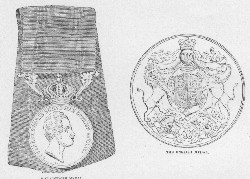 |
 |
For a free lecture to the cabmen and omnibus drivers of London, the Royal Society for the Prevention of Cruelty to Animals presented to Mr. Rarey a splendid gold medal. The government employed him to teach his method to two classes of cavalry, and so the method was communicated to the entire army. Resisting many invitations to make England his home, he decided to return to his native land and, on October 27, 1860, gave a farewell lecture to an audience of 8,000 in Crystal Palace. In the course of his remarks, he thanked England for the great kindness he had experienced and hoped that the introduction of his method had been of advantage to the cause of humanity. He had always sympathized with the noble horse and he was delighted that he had been able to prove that so much might be done by kindness. Returning to America, he would bear the most grateful feelings toward the English people.
With the esteem of all he had met and unspoiled by their praise, Mr. Rarey took passage for New York. The Herald of November 11, 1860, hailed him as "the subjugator of vicious steeds, the recipient of honors and decorations from royal and imperial hands, the tutor of chevaliers and dames with equestrian tastes, the wearer of medals awarded by several humane societies of England and Scotland, the modern Centaur." "He is returning," continued the Herald, "after a three years' absence, during which he astonished high and low with proofs of his wondrous skill in taming refractory brutes. A cavalcade of our best horsemen and Amazons can be formed to escort this American prince of horse-tamers from the battery to the Fifth Avenue Hotel. And why should we not honor Mr. Rarey with a grand reception. He is one of those men whose talents have helped to make our country famous in other lands. In fact, in all departments of art and science, Americans have shown themselves first among the foremost. In his own useful way, Mr. Rarey has outstripped all the world. The very Arab marvels at his influence over the horse, and calls upon Allah to attest his wonderful power. Is it not then highly proper that we should extend a fitting reception to the great horse tamer? We feel assured that our suggestion will be acted on and that Mr. Rarey will meet a welcome worthy of him."